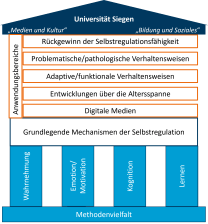Welcome to the website of the Chair of General Psychology
General psychology deals with the laws of experience and behavior that apply to all people to a more or less comparable extent. These are the laws of information intake, processing and storage that are relevant to the control of behavior. Central constructs of general psychology are Perception, attention and consciousness, motivation and emotion, learning and memory, action and motor skills, language, thinking, decision making and problem solving.
The research of the working group headed by Prof. Dr. Stephanie Antons focuses on the psychological mechanisms of self-control and self-regulation, in particular their psychophysiological foundations. We investigate both processes of successful and diminished self-control, such as in the context of behavioral addictions and the use of digital media across the lifespan.

About our working group
Brief introduction of the professorship

In addition to researching basic psychological mechanisms, such as self-control, we are particularly interested in the psychological mechanisms that lead to the development and maintenance of behavioral addictions. We ask ourselves why some people have reduced control because of these rewarding behaviors and experience suffering and functional limitations in everyday life as a result.
Our research profile
The General Psychology team conducts research focusing on the investigation of basic psychological mechanisms of self-control and self-regulation with a particular focus on their psychophysiological foundations.
Both the mechanisms of successful self-control and those of reduced self-control are examined.
Following on from the profile area "Media and Culture" at the University of Siegen and Schools II, these fundamental mechanisms are being researched in particular in the context of the use of digital media across the lifespan . For the investigation of the mechanisms of reduced self-control, behavioral addictions (in particular Internet use disorders) are used as a model for behaviors with reduced control, as they lead to limited control without the direct influence of substances. Such behavioral patterns occur more frequently in children and adolescents, but are also highly relevant in adulthood. These topics are highly relevant both from a basic research perspective and with regard to possible areas of application.
The studies focus on the following research questions:
- Which psychological mechanisms condition successful and diminished self-control?
- What role do mechanisms of inhibition control, reward processing and habitualization through learning processes play?
- How do these basic mechanisms contribute to reduced control in disorders such as behavioral addictions?
- Is it possible to predict moments of diminished control in the natural environment based on psychophysiological data?
- What are the determinants for the development of adaptive self-regulation (especially in relation to media use) in children and adolescents?

Latest publications
A list of the most recent publications
Antons, S., Müller, S. M., Thomas, T. A., Schmid, A. M., Kessling, A., Joshi, M., Krikova, K., Kampa, M., Mallon, L., Schmidt, L. D., Klein, L., Dominick, N., Büsche, K., Oelker, A., Brandtner, A., Montag, C., Wölfling, K., Wolf, O. T., Klucken, T., Rumpf, H.-J., Steins-Löber, S., Stark, R., Müller, A., Diers, M., Wegmann, E., & Brand, M. (in press). Cue-reactivity towards distal cues in specific internet-use disorders: Findings from diagnostically validated samples. British Journal of Psychiatry. https://doi.org/10.1192/bjp.2025.10379
Antons, S., Heyder, A., Precht, L.-M., Wegmann, E., Liebherr, M., & Brailovskaia, J. (2025). The digital media use effects-scales for adolescents (d-MUsE-scales): Conceptualization and validation of a screening tool. Computers in Human Behavior Reports. 18. https://doi.org/10.1016/j.chbr.2025.100621
Richter, M., & Wühr, P. (2024). Different grasping experiences affect mapping effects but not correspondence effects between stimulus size and response location. Psychological Research, 88(7), 2021-2035. https://doi.org/10.1007/s00426-024-01990-5
Richter, M., & Wühr, P. (2024). The reciprocity of spatial-numerical associations of vocal response codes depends on stimulus mode. Memory & Cognition, 52, 944-964. https://doi.org/10.3758/s13421-023-01511-6
The complete list of publications can be found here.
Contact the professorship
Postal address
University of Siegen
Faculty II - Department of Psychology
General Psychology
Secretariat Andrea Thielmann
Adolf-Reichwein-Str. 2 a
57076 Siegen
Visitor address
University of Siegen
Department of Psychology
US-V 204
Obergraben 23
57072 Siegen
Secretariat
Please contact Andrea Thielmann.





